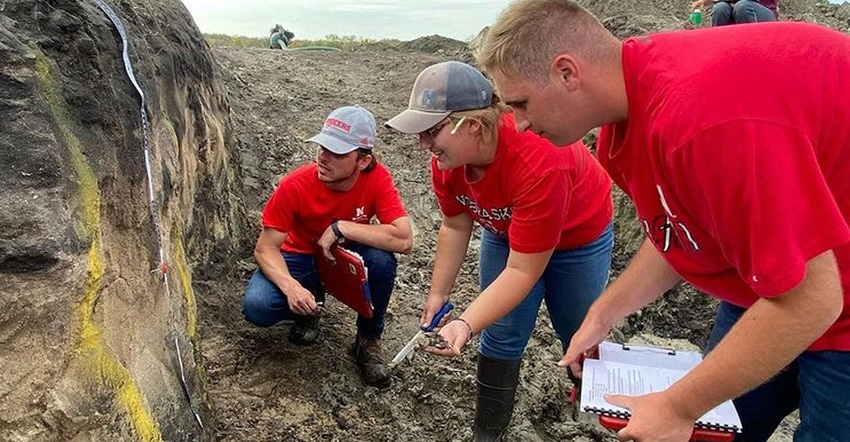August 4, 2022

We live in a fast-paced world where our attention is pulled to so many things it can be easy to forget the foundation we all stand on, literally. Soil is that foundation for all life on Earth and is a complex system that houses billions of living organisms.
While most will refer to soil as “dirt,” the University of Nebraska soil judging team digs deeper to learn the art of soil classification and understand soil development. This group of students has the opportunity to gain experience with soils across the country and see the impacts of different management styles.
Dig into dirt
Led by Judy Turk, pedologist and assistant professor at UNL School of Natural Resources, and Becky Young, assistant professor in the UNL agronomy and horticulture department, the team competes at regional, national and international competitions, with the goal to better understand the world beneath our feet. Young, who teaches an Introduction to Soil Science class, describes soil judging as a “unique, immersive, experimental, field-based learning opportunity that is taught competitively.” The competitions allow students to develop an understanding of land development and potential uses. The contest was developed in the 1960s as a way to train field soil scientists charged with the important task of mapping America’s soils.
Soil science is a difficult topic to understand because we don’t see soil very often; and if we do, we can’t watch it change in a short amount of time, Young says. Apart from catastrophic events, soils take millions of years to develop a complex and interesting profile, which tells a story of development and future fertility.
“Students gain experience by seeing soils firsthand under different management, which helps them to develop an appreciation and awareness of how soil can change under different management styles,'' Turk says. Soil judging contests are held over a week, allowing time for students to practice and get familiar with the area. This also allows contest organizers to present a variety of different soil types and management styles. It allows an opportunity for USDA Natural Resources Conservation Service, landowners and industry partners to work together to improve the overall awareness of soil and gain an appreciation for soil health, Turk says.
Networking
The collaboration among industry, government and education also creates an environment for professional development. “An important aspect of the contest is making connections with people from different schools, which leads to professional networks,” Young says. These connections can lead to further job opportunities and peer support as a new generation of soil scientists enters the workforce. Kennadi Griffis, a third-year UNL environmental science major with an emphasis on soil science and a water science minor, has found success in these competitive opportunities. Griffis earned first place overall-individual at the regional contest in Crookston, Minn., and fourth high individual at the national contest in Columbus, Ohio. She joined Team USA in the international contest held in July in Scotland, becoming the first student from Nebraska to earn a spot on the national team.
“Soil judging helped me realize I wanted to pursue fieldwork,” Griffis says. “When I am getting dirty in the soil pit, that’s when I don’t feel like I’m doing work, but just having fun.” Griffis is a part of a four-member team comprised of rising professionals from across the country, who will compete against eight other nations to learn and better sharpen their skills for their careers. Griffis will also have an opportunity to attend the 2022 World Congress of Soil Science, which is a meeting of soil scientists from around the world that takes place every four years in a different international location. In the future, both Turk and Young want to see students return to the team year after year, in hopes of creating a professional community. To follow along with the progress of the UNL team, follow the team Facebook page, unlsoiljudging.wixsite.com/unlsoiljudging, or its Twitter account, @unlsoiljudgingteam.
Brockman writes from Lincoln and is also a member of the UNL soil judging team.
You May Also Like




